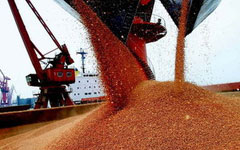Chen Xiwen, deputy chief of the Central Rural Work Leading Group, said China seeks to cooperate with large agricultural trade partners that have abundant agricultural resources and a desire to become more globalized.
"To ensure a high self-sufficiency rate for staple grain output, and to gradually adjust China's developing agricultural structure, increasing imports of certain agricultural products from the international market can make up for domestic shortages for the time being," Chen said.
|
 |
|
 |
The Chinese government is preparing new solutions to upgrade the nation's agricultural sector this year, including setting up new standards for high-yield farmland and reinforcing protection of agricultural resources and the environment.
Hu Hanping, director of Nanchang-based Jiangxi Academy of Agricultural Sciences, warned that China is still having a problem propping up domestic oilseed prices because the country purchases a large amount of soybeans and vegetable oils internationally.
China lowered tariffs on imported commodities and agricultural products, including cotton, grain and edible oil, when the country joined the World Trade Organization in 2001. This policy has raised the domestic price of farm products above international market prices.
To further ensure the income for domestic farmers, China introduced floor prices in 2006 and appointed public bodies - China Grain Reserves Corp and China National Cotton Reserves Corp - to buy such products as wheat, corn and cotton for State reserves when market prices fall below floor prices.
"Under such circumstances, domestic oil-processing enterprises are happy to purchase US soybeans to cover the rising cost of labor, electricity and logistics," Hu said.
"However, they cannot simply raise their product price and pass the higher raw material costs onto consumers as they also have to face competition from foreign vegetable oil producers."
Don't miss:
|
 |
 |
| China's top 10 richest cities |
